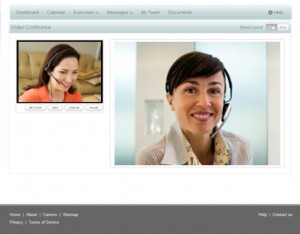 A diabetes-focused behavioral health remote visits program can help participants who complete it to lower their levels of stress, anxiety, and depression, while increasing their frequency of glucose self-testing, according to a retrospective study of 466 people published in Telemedicine and eHealth.
A diabetes-focused behavioral health remote visits program can help participants who complete it to lower their levels of stress, anxiety, and depression, while increasing their frequency of glucose self-testing, according to a retrospective study of 466 people published in Telemedicine and eHealth.
The study was conducted by AbilTo, which offers a remote visits behavior health service. The study used deidentified records of AbilTo program participants who enrolled in the program between August 2014 and January 2015. The study looked at 778 people who at least began the AbilTo program, but the study excluded 284 who did not end up completing the program. A further 28 were not included in the study because they did not complete the program in time to be assessed for the study.
"Programs such as AbilTo's are effective in motivating diabetes patients to make healthy changes at a gradual pace,” AbilTo Chief Clinical Officer and study co-author Aimee Peters said in a statement. “By fostering skills like improving and tracking food choices, participants learn the clear connection between their behaviors and stable blood glucose levels. They leave the program with a new sense of confidence and control, as well as a practical plan for sustaining their health improvements."
AbilTo is focused on identifying and remotely treating mental health co-morbidities that can negatively affect recovery from medical conditions or events such as cardiac events, diabetes, or breast cancer. The company works with health plans and employers, including Aetna and Costco, to identify the individuals in an employee population that are at the highest risk for these complications and are the most likely to be helped by treatment. Then those patients are invited to an eight-week messaging program with a licensed clinical social worker (LCSW) and behavioral health coach that can be carried out either online or on the telephone based on the participant’s preference.
Before they began the program, 32 percent of participants had elevated depression scores, 33 percent had elevated anxiety scores, and 31 percent had elevated stress scores. AbilTo found that there was a significant reduction in mean depression among participants that started the program with elevated depression scores.
Within this group, 67 percent transitioned to normal depression by the time they finished the program. Additionally, 59 percent of participants with elevated anxiety and 70 percent of participants that had elevated stress scores left the program with normal normal anxiety and stress scores.
Last year, AbilTo raised $12 million in third round funding led by HLM Venture Partners. Existing investors BlueCross BlueShield Venture Partners, .406 Ventures and Sandbox Industries all contributed to the round as well.












